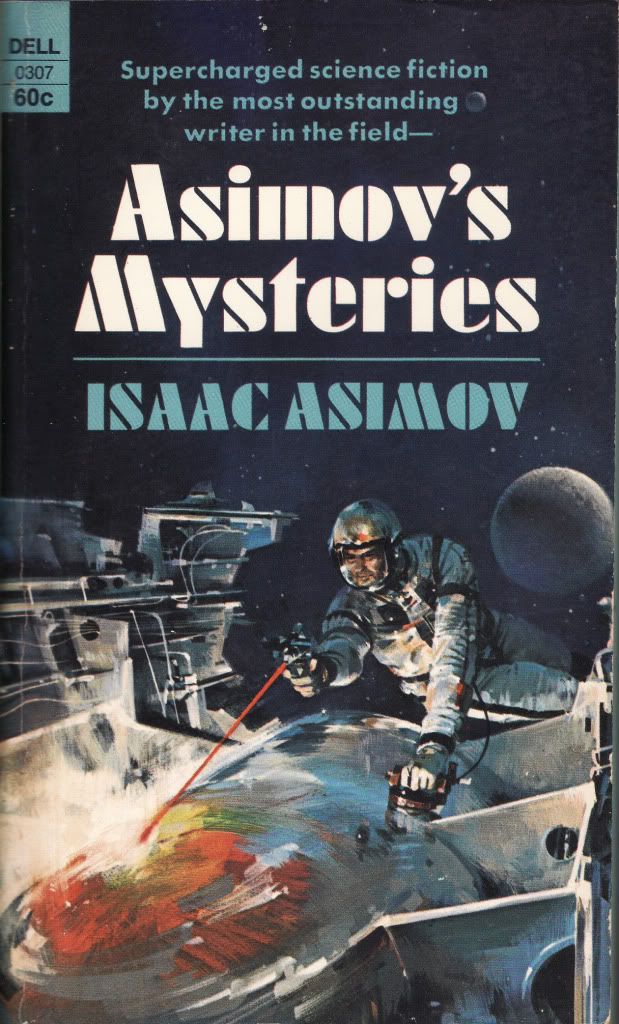J-Sun : But you're mixing the cycle, wouldn't that be confusing ?
No - everybody from 1939 to 1993 had to read them "out of order" and nobody was confused.

They weren't always intended to be a pre-planned giant series and internal order isn't of primary importance - if you read in written order you'll (a) be able to see how the series developed and (b) read the best stuff earlier than the lesser stuff and (c) can then put the whole series in internal order in your head when you're done (or, as I say, re-read 'em all in any order). (Regarding (b), I'll agree with Ray and hsf that his "late" stuff isn't generally as good as his "early" stuff but wouldn't go as far as they seem to. I think
Foundation's Edge and
Robots of Dawn are still great - different from the early stuff (especially
Foundation's Edge, being a largish novel instead of more stories) - and I wouldn't advise skipping them (or any Asimov, really - there's no Asimov I haven't been glad I read, even the Lucky Starr juveniles and
Fantastic Voyage novelization and sequel (though
Fantastic Voyage is probably the very least of his books)). But I do agree that
Robots and Empire is problematic and everything after that is very different.
Back on the issue of potential confusion: the robot stories have a couple of recurring subsets (the ones that feature Susan Calvin and those with Donovan & Powell) but they are essentially independent stories connected by a common Three Laws of Robotics/"U.S. Robots and Mechanical Men" background. Asimov sequenced them in
I, Robot to tell a sort of mini-future history but this is more of an imposed order than a planned thing. Then the Robot novels follow on from those and use the Three Laws but are pretty separate from the stories (though there is one Baley/Olivaw story). In terms of themselves, they are a set of mostly separate cases, one per novel. The Empire novels are actually completely independent from one another in a plot/character sense. They just share the "Trantorian Empire" background. And it's Trantor that the Foundation is trying to replace in the Foundation stories, but nothing much is specifically referred to from the Empire novels in Foundation. It's only the Foundation stories themselves, which make up the Foundation Trilogy, which were actually pretty quickly intended to be a strict, chronological series and directly build on each other though, even there, the series evolved, being made of shorter and loosely connected stories at first and then getting longer and more tightly connected (the last two volumes are already very different from the first).
And that's the way it stood for over 30 years, except for some more miscellaneous (and often superlative) Robot stories.
So then he wrote a Foundation sequel to the Trilogy and released the new compilation of Robot stories with
The Complete Robot in 1982 and wrote a third Baley/Olivaw mystery in 1983. So far, so simple.
But then he changed the nature of all the series with
Robots and Empire in 1985 and continued that story (well, actually
Foundation's Edge's story, but with the changes introduced in
Robots and Empire included) to what many fans find a questionable end in 1986's
Foundation and Earth. And then he felt he could really only write prequels rather than go further, so wrote the two prequels in '88 and '93. Those two are actually set
before the Foundation Trilogy and, if you read the prequels first, you'll never be able to experience the Foundation Trilogy as all the fans between 1950 and 1985 did - and this was how its reputation was built and what was given the 1966 Hugo Award for Best All-Time Series.
Anyway, what I'm saying is that it's up to you, but don't focus too much on the series being an overly ordered and connected thing and don't worry about getting confused by reading them how Asimov wrote them and how a lot of people read them.

And glad you're enjoying
I, Robot and that he's becoming your favorite author - it's a great book, and he's mine, too.


